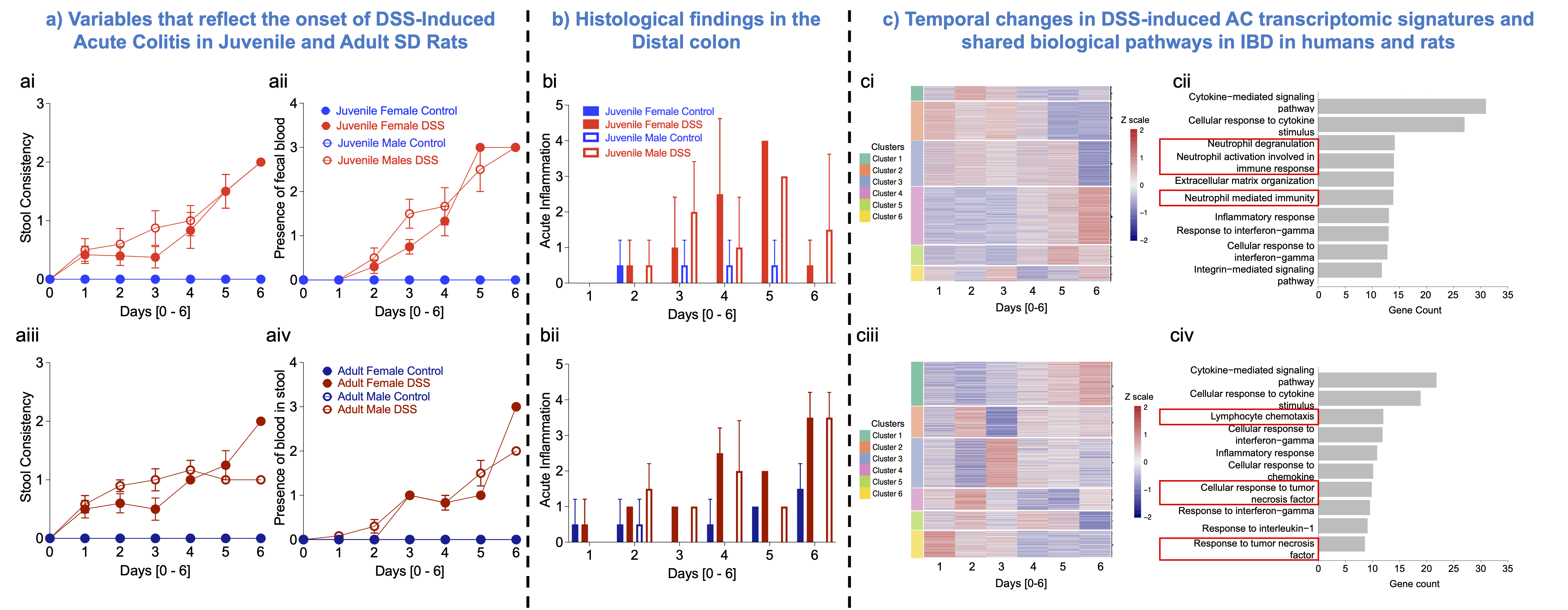Tuesday Poster Session
Category: IBD
P5387 - Age-Dependent Variability in Acute Colitis: Bridging Preclinical Models and Human Disease Insights
Tuesday, October 28, 2025
10:30 AM - 4:00 PM PDT
Location: Exhibit Hall

Alix A. Guevara Tique, PhD (she/her/hers)
Stanford University School of Medicine
Los Gatos, CA
Presenting Author(s)
Alix A. Guevara Tique, PhD1, Steven levitte, MD, PhD2, Shayaan Memon, 3, Shashank Chetty, PhD4, Jing Wang, MD5, Benjamin Dulken, MD, PhD6, Abantika Ganguly, PhD7, Javier Torres, PhD8, Avnesh S. Thakor, MD, PhD, MA, MSc, BA9
1Stanford University School of Medicine, Los Gatos, CA; 2Stanford University School of Medicine, Palo Alto, CA; 3Stanford University, Northridge, CA; 4Stanford University, Santa Clara, CA; 5Stanford University, Palo Alto, CA; 6Stanford University, Stanford, CA; 7Stanford Medicine, Palo Alto, CA; 8IMSS, Mexico, Distrito Federal, Mexico; 9STANFORD UNIVERSITY, Palo Alto, CA
Introduction: Acute colitis (AC) in children is a significant global health concern due to severe inflammatory phenotypes that are often resistant to standard therapies. Preclinical models to study AC frequently overlook age-related differences in immune responses. In the present study, we investigated the physiological, histological, and transcriptomic differences between juvenile and adult Sprague-Dawley (SD) rats with dextran sulfate sodium (DSS) induced AC.
Methods: Experiments were conducted on juvenile (3-4 weeks old) and adult (6-7 weeks old) SD rats, following the Administrative Panel on Laboratory Animal Care approval at Stanford University. AC was induced by administering 5.5% DSS in the animal’s drinking water over six days. Daily assessments included body weight, stool consistency (scored from Normal (0) to Diarrhea (2)) and presence of blood via a Hemoccult test (scored from Negative (0) to Gross bleeding (3)). A total of 96 rats were analyzed. Post-sacrifice, tissue samples from the ileum, proximal and distal colon were collected for histological analysis in which they were fixed in 10% neutral-buffered formalin and stained with hematoxylin and eosin. For transcriptome analysis, distal colon samples were preserved in RNAlater at −80°C and bulk RNA sequencing was performed with differential gene expression analysis conducted with a corrected P-value threshold of 0.05 and an absolute fold change of ±1.
Results: Juvenile rats exhibited a more severe presentation of DSS-induced AC compared to adult animals, evidenced by stool consistency, blood presence, and acute inflammation. Females showed greater severity than males in both age groups. Transcriptomic analysis indicated that juvenile animals exhibited a robust neutrophil-mediated inflammatory response, while adults displayed a lymphocytic immune response characterized by elevated tumor necrosis factor expression.
Discussion: These findings highlight age-dependent variability in acute colitis, emphasizing the need for tailored therapeutic strategies and the translational relevance of findings in juvenile animals for pediatric patients.

Figure: Figure 1: Characterization of the AC in vivo model in juvenile and adult SD rats following 6 days of DSS exposure. AC was induced by administering 5.5% DSS in drinking water for six days. Key parameters were assessed, including changes in stool consistency (panels ai and aiii), presence of blood in the stool (panels aii and aiv), acute inflammation (panels bi and bii), and temporal changes in gene expression throughout disease progression (panels ci and ciii). Transcriptomic analysis revealed that juvenile rats exhibited a robust neutrophil-mediated inflammatory response, while adults displayed a lymphocytic immune response characterized by elevated tumor necrosis factor (TNF) expression. These findings mimic the alterations observed in pediatric and adult patients with inflammatory bowel disease (IBD) (panels cii and civ). Stool consistency was scored as Normal (0), Soft or Loose (1), and Diarrhea (2), while fecal blood presence was categorized as Negative (0), Positive (1), Double Positive (2), and Gross Bleeding (3). Acute inflammation was indicated by the presence of neutrophilic infiltration in the distal colon, which was scored as Extremely Rare (1), Mild (2), Moderate (3), and Severe (4). Figures were generated using Prism and R software, presenting data as mean ± standard error of the mean (SEM). Differentially Expressed Genes (DEGs) in the left colon were calculated using negative binomial generalized linear models with the DESeq2 package (v3.14). Resulting P-values were adjusted using Benjamini and Hochberg's method to control the False Discovery Rate (FDR). DEGs were defined based on a corrected P-value ≤0.05 and an absolute fold-change threshold of +1 or -1 for significant differential expression. Genes with non-significant fold changes in at least one of the six days of study or with an absolute read count of zero in more than four samples were considered lowly expressed and filtered out. Orthologous genes between SD rats and humans were identified using the Rat Genome Database (RGD), and enrichment analyses were performed using the enrichR package, focusing on Gene Ontology (GO) databases to identify the primary biological processes associated with the DEGs. A p-value ≤ 0.05 and a minimum gene count of three per biological pathway were applied. Heatmaps depicting temporal expression changes were constructed using the pheatmap package in R.
Disclosures:
Alix Guevara Tique indicated no relevant financial relationships.
Steven levitte: Genentech Inc – Employee, Stock Options, Stock-publicly held company(excluding mutual/index funds).
Shayaan Memon indicated no relevant financial relationships.
Shashank Chetty indicated no relevant financial relationships.
Jing Wang indicated no relevant financial relationships.
Benjamin Dulken indicated no relevant financial relationships.
Abantika Ganguly indicated no relevant financial relationships.
Javier Torres indicated no relevant financial relationships.
Avnesh Thakor: Aion Health – Advisor or Review Panel Member. AlloTRx – Advisor or Review Panel Member. Alpfa Medical – Consultant. Cellular Vehicles – Advisor or Review Panel Member. Genentech – Consultant. Inari Medical – Consultant. Lisata – Consultant. Nephrogen – Advisor or Review Panel Member. Respond Health – Advisor or Review Panel Member. ReThink64 – Advisor or Review Panel Member. Teal Health – Advisory Committee/Board Member. Twins Digital – Advisor or Review Panel Member.
Alix A. Guevara Tique, PhD1, Steven levitte, MD, PhD2, Shayaan Memon, 3, Shashank Chetty, PhD4, Jing Wang, MD5, Benjamin Dulken, MD, PhD6, Abantika Ganguly, PhD7, Javier Torres, PhD8, Avnesh S. Thakor, MD, PhD, MA, MSc, BA9. P5387 - Age-Dependent Variability in Acute Colitis: Bridging Preclinical Models and Human Disease Insights, ACG 2025 Annual Scientific Meeting Abstracts. Phoenix, AZ: American College of Gastroenterology.
1Stanford University School of Medicine, Los Gatos, CA; 2Stanford University School of Medicine, Palo Alto, CA; 3Stanford University, Northridge, CA; 4Stanford University, Santa Clara, CA; 5Stanford University, Palo Alto, CA; 6Stanford University, Stanford, CA; 7Stanford Medicine, Palo Alto, CA; 8IMSS, Mexico, Distrito Federal, Mexico; 9STANFORD UNIVERSITY, Palo Alto, CA
Introduction: Acute colitis (AC) in children is a significant global health concern due to severe inflammatory phenotypes that are often resistant to standard therapies. Preclinical models to study AC frequently overlook age-related differences in immune responses. In the present study, we investigated the physiological, histological, and transcriptomic differences between juvenile and adult Sprague-Dawley (SD) rats with dextran sulfate sodium (DSS) induced AC.
Methods: Experiments were conducted on juvenile (3-4 weeks old) and adult (6-7 weeks old) SD rats, following the Administrative Panel on Laboratory Animal Care approval at Stanford University. AC was induced by administering 5.5% DSS in the animal’s drinking water over six days. Daily assessments included body weight, stool consistency (scored from Normal (0) to Diarrhea (2)) and presence of blood via a Hemoccult test (scored from Negative (0) to Gross bleeding (3)). A total of 96 rats were analyzed. Post-sacrifice, tissue samples from the ileum, proximal and distal colon were collected for histological analysis in which they were fixed in 10% neutral-buffered formalin and stained with hematoxylin and eosin. For transcriptome analysis, distal colon samples were preserved in RNAlater at −80°C and bulk RNA sequencing was performed with differential gene expression analysis conducted with a corrected P-value threshold of 0.05 and an absolute fold change of ±1.
Results: Juvenile rats exhibited a more severe presentation of DSS-induced AC compared to adult animals, evidenced by stool consistency, blood presence, and acute inflammation. Females showed greater severity than males in both age groups. Transcriptomic analysis indicated that juvenile animals exhibited a robust neutrophil-mediated inflammatory response, while adults displayed a lymphocytic immune response characterized by elevated tumor necrosis factor expression.
Discussion: These findings highlight age-dependent variability in acute colitis, emphasizing the need for tailored therapeutic strategies and the translational relevance of findings in juvenile animals for pediatric patients.

Figure: Figure 1: Characterization of the AC in vivo model in juvenile and adult SD rats following 6 days of DSS exposure. AC was induced by administering 5.5% DSS in drinking water for six days. Key parameters were assessed, including changes in stool consistency (panels ai and aiii), presence of blood in the stool (panels aii and aiv), acute inflammation (panels bi and bii), and temporal changes in gene expression throughout disease progression (panels ci and ciii). Transcriptomic analysis revealed that juvenile rats exhibited a robust neutrophil-mediated inflammatory response, while adults displayed a lymphocytic immune response characterized by elevated tumor necrosis factor (TNF) expression. These findings mimic the alterations observed in pediatric and adult patients with inflammatory bowel disease (IBD) (panels cii and civ). Stool consistency was scored as Normal (0), Soft or Loose (1), and Diarrhea (2), while fecal blood presence was categorized as Negative (0), Positive (1), Double Positive (2), and Gross Bleeding (3). Acute inflammation was indicated by the presence of neutrophilic infiltration in the distal colon, which was scored as Extremely Rare (1), Mild (2), Moderate (3), and Severe (4). Figures were generated using Prism and R software, presenting data as mean ± standard error of the mean (SEM). Differentially Expressed Genes (DEGs) in the left colon were calculated using negative binomial generalized linear models with the DESeq2 package (v3.14). Resulting P-values were adjusted using Benjamini and Hochberg's method to control the False Discovery Rate (FDR). DEGs were defined based on a corrected P-value ≤0.05 and an absolute fold-change threshold of +1 or -1 for significant differential expression. Genes with non-significant fold changes in at least one of the six days of study or with an absolute read count of zero in more than four samples were considered lowly expressed and filtered out. Orthologous genes between SD rats and humans were identified using the Rat Genome Database (RGD), and enrichment analyses were performed using the enrichR package, focusing on Gene Ontology (GO) databases to identify the primary biological processes associated with the DEGs. A p-value ≤ 0.05 and a minimum gene count of three per biological pathway were applied. Heatmaps depicting temporal expression changes were constructed using the pheatmap package in R.
Disclosures:
Alix Guevara Tique indicated no relevant financial relationships.
Steven levitte: Genentech Inc – Employee, Stock Options, Stock-publicly held company(excluding mutual/index funds).
Shayaan Memon indicated no relevant financial relationships.
Shashank Chetty indicated no relevant financial relationships.
Jing Wang indicated no relevant financial relationships.
Benjamin Dulken indicated no relevant financial relationships.
Abantika Ganguly indicated no relevant financial relationships.
Javier Torres indicated no relevant financial relationships.
Avnesh Thakor: Aion Health – Advisor or Review Panel Member. AlloTRx – Advisor or Review Panel Member. Alpfa Medical – Consultant. Cellular Vehicles – Advisor or Review Panel Member. Genentech – Consultant. Inari Medical – Consultant. Lisata – Consultant. Nephrogen – Advisor or Review Panel Member. Respond Health – Advisor or Review Panel Member. ReThink64 – Advisor or Review Panel Member. Teal Health – Advisory Committee/Board Member. Twins Digital – Advisor or Review Panel Member.
Alix A. Guevara Tique, PhD1, Steven levitte, MD, PhD2, Shayaan Memon, 3, Shashank Chetty, PhD4, Jing Wang, MD5, Benjamin Dulken, MD, PhD6, Abantika Ganguly, PhD7, Javier Torres, PhD8, Avnesh S. Thakor, MD, PhD, MA, MSc, BA9. P5387 - Age-Dependent Variability in Acute Colitis: Bridging Preclinical Models and Human Disease Insights, ACG 2025 Annual Scientific Meeting Abstracts. Phoenix, AZ: American College of Gastroenterology.
